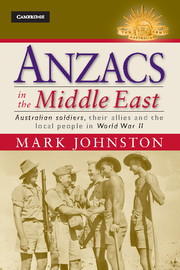Book contents
- Frontmatter
- Contents
- Photographs
- Maps
- Preface
- Acknowledgements
- Abbreviations
- Introduction
- Chapter 1 Travelling to the ‘great adventure’
- Chapter 2 ‘A different world’
- Chapter 3 ‘They're troublesome, you know’
- Chapter 4 ‘Fighting shoulder to shoulder’
- Chapter 5 ‘Australia, Australia, you are good’
- Chapter 6 ‘Unity of feeling and purpose’
- Chapter 7 ‘They treat us as a dependent nation’
- Chapter 8 ‘Gyppo Land’
- Conclusion
- Notes
- Bibliography
- Index
Chapter 5 - ‘Australia, Australia, you are good’
Crete
Published online by Cambridge University Press: 05 February 2013
- Frontmatter
- Contents
- Photographs
- Maps
- Preface
- Acknowledgements
- Abbreviations
- Introduction
- Chapter 1 Travelling to the ‘great adventure’
- Chapter 2 ‘A different world’
- Chapter 3 ‘They're troublesome, you know’
- Chapter 4 ‘Fighting shoulder to shoulder’
- Chapter 5 ‘Australia, Australia, you are good’
- Chapter 6 ‘Unity of feeling and purpose’
- Chapter 7 ‘They treat us as a dependent nation’
- Chapter 8 ‘Gyppo Land’
- Conclusion
- Notes
- Bibliography
- Index
Summary
Most of the Australians who escaped from Greece – and 1500 did not – reached Alexandria. Those who landed in Crete numbered 8500. On mainland Greece the Australians felt an unprecedented level of support from the local people, but on Crete that assistance reached new heights. Only in New Guinea would they have local people fighting alongside them in a comparable way.
Landed on Crete partly by accident, the Australians were in many cases left to their own devices for some time before defensive plans were fully established. All were exhausted by their ordeal on the mainland, and lacked such necessities as blankets and cooking gear. ‘This Crete is a lousy joint’, wrote one disenchanted gunner, while a sapper asserted soon after the campaign: ‘I never liked that place from the day I set foot on it. I had a premonition of disaster.’ However, others felt like the corporal who wrote in a letter from Crete: ‘…it is a beautiful island and the people are so homely and friendly.’
The troops needed to forage and wanted to unwind. Even the Australian official history notes that initially there was not much for many Australians to do, ‘except rest under the olive trees, forage for food and equipment, eat – and perhaps get into trouble’. Long says that, for men used to drinking beer, the heavy Greek wines were ‘treacherous’. Some British accounts emphasise the misbehaviour of Australians in this prebattle period. Australians were soon barred from certain areas once the ill-effects of alcohol, especially the local brew, manifested themselves.
- Type
- Chapter
- Information
- Anzacs in the Middle EastAustralian Soldiers, their Allies and the Local People in World War II, pp. 95 - 110Publisher: Cambridge University PressPrint publication year: 2012



